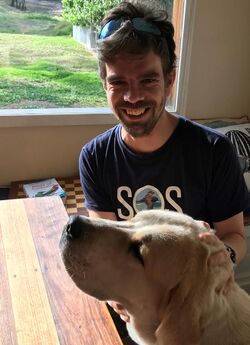Biography:Alex Bond
Alexander L. Bond, PhD | |
|---|---|
 Alex Bond in Australia in 2018 with CAO dog | |
| Born | Canada |
| Occupation | Conservation scientist |
Alexander L. Bond is a Canadian conservation biologist, ecologist, and curator. He is a senior curator at the Natural History Museum at Tring.
Education
Bond completed a B.Sc. with honors in biology from Mount Allison University in 2005 and published a thesis titled Daytime spring migrations of scoters (Melanitta spp.) in the Bay of Fundy. He earned an M.Sc. from University of New Brunswick in 2007.[1] His thesis was entitled Patterns of mercury burden in the seabird community of Machias Seal Island, New Brunswick.[1] Bond completed a Ph.D. in 2011 at Memorial University of Newfoundland. His thesis there was called Relationships between oceanography and the demography & foraging of auklets (Charadriiformes, Alcidae: Aethia; Merrem 1788) in the Aleutian Islands.[1] He was a NSERC Visiting Fellow in Government Laboratories, Environment and Climate Change Canada, Canada from 2013 – 2014[2] and a NSERC post-doctoral fellow at the University of Saskatchewan from 2011 to 2013.[3]
Career
Bond is a conservation biologist with a focus on the marine environment and island biology. His current specialisations include conservation, contaminants, invasive species, plastic, seabirds and stable isotopes.[3] He was a NSERC visiting fellow at Environment and Climate Change Canada from 2013 to 2014. From 2014 to 2017, he was a senior conservation scientist for the Royal Society for the Protection of Birds at the Centre for Conservation Science. Bond was an adjunct professor at the University of Saskatchewan School of Environment and Sustainability from 2014 to 2019.[4] until 2023 he was an honorary researcher at the Institute for Marine and Antarctic Studies and is a primary research member of the Adrift Lab, both based in Tasmania, Australia.[5] Bond is a senior curator of birds in the department of life sciences at the Natural History Museum at Tring.[3]
Since 2012, Bond is a subject editor of Avian Conservation and Ecology.[3]
Since 2013, Bond has written and blogged on science and Queer in STEM topics using the name The Lab and Field;[6] he also uses this name on Twitter.[7] He is part of the 500 Queer Scientists campaign,[8] and co-chair and administrator of LGBTQ+ STEM.[9][10] In 2020 Bond and Beth Montague-Hellen shared the Royal Society Athena Prize for his work with LGBTQ+ STEM.[11] In 2020, he took part in the inaugural QatCanSTEM[12] colloquium at Dalhousie University in Canada.[13]
Since 2021, Bond has been the Ornithologist-in-Residence at St. Nicholas's Church, Leicester.
Bond is most noted for his work on plastic pollution in oceans[14][15] and especially the health effects on seabirds.[16][17][18][19][20]
Personal life
Due to being gay, Bond and his partner decided to not pursue graduate school or positions located in the United States, opting instead for Canada or the United Kingdom.[21]
References
- ↑ 1.0 1.1 1.2 "Alexander Bond" (in en). https://pure.uhi.ac.uk/en/persons/alexander-bond.
- ↑ "Alex Bond – The Environmental Research Institute" (in en-GB). https://eri.ac.uk/members/alex-bond/.
- ↑ 3.0 3.1 3.2 3.3 "Dr Alex Bond | Natural History Museum" (in en). https://www.nhm.ac.uk/our-science/departments-and-staff/staff-directory/alex-bond.html.
- ↑ "Dr Alex Bond" (in en). 2013-06-20. https://alexanderbond.org/profile/.
- ↑ "Adrift Lab" (in en-AU). https://adriftlab.org/.
- ↑ "The Lab and Field" (in en). https://labandfield.wordpress.com/.
- ↑ "Dr Alex Bond (@TheLabAndField)" (in en). https://twitter.com/TheLabAndField.
- ↑ "500 Queer Scientists - Alex Bond" (in en). https://www.500queerscientists.com/fullscreen-page/comp-jgwk54xq/89b57d02-e8e8-438f-9171-f3ca623aa076/393.
- ↑ "Alex Bond" (in en-US). https://www.scicurious.co.uk/episodes/2020/2/1/alex-bond.
- ↑ "Dr Alex Bond" (in en). 15 July 2019. https://metro.co.uk/author/dr-alex-bond/.
- ↑ "Royal Society Athena Prize" (in en). https://royalsociety.org/grants-schemes-awards/awards/athena-prize/.
- ↑ "Queer Atlantic Canadian STEM" (in en). https://qatcanstem.github.io/.
- ↑ "'We exist': Conference celebrates queer voices in STEM" (in en-US). https://signalhfx.ca/halifax-event-connects-queer-voices-in-stem/.
- ↑ Lavers, Jennifer L.; Bond, Alexander L. (2017-06-06). "Exceptional and rapid accumulation of anthropogenic debris on one of the world's most remote and pristine islands" (in en). Proceedings of the National Academy of Sciences 114 (23): 6052–6055. doi:10.1073/pnas.1619818114. ISSN 0027-8424. PMID 28507128. Bibcode: 2017PNAS..114.6052L.
- ↑ Serra-Gonçalves, Catarina; Lavers, Jennifer L.; Bond, Alexander L. (2019-11-05). "Global Review of Beach Debris Monitoring and Future Recommendations". Environmental Science & Technology 53 (21): 12158–12167. doi:10.1021/acs.est.9b01424. ISSN 0013-936X. PMID 31577441. Bibcode: 2019EnST...5312158S. https://eprints.utas.edu.au/31874/1/135317%20-%20Global%20review%20of%20beach%20debris%20monitoring_preprint.pdf.
- ↑ "Ocean plastic is changing the blood chemistry of seabirds" (in en). https://www.nhm.ac.uk/discover/news/2019/july/ocean-plastic-is-changing-the-blood-chemistry-of-seabirds.html.
- ↑ "Ocean plastic affecting shearwaters' blood chemistry, study finds" (in en-GB). 2019-07-31. https://www.oceanographicmagazine.com/ocean-plastic-shearwaters/.
- ↑ "Seabirds that eat plastic—and live—have major health problems" (in en). 2019-08-02. https://www.nationalgeographic.com/environment/2019/08/seabirds-eat-plastic-major-health-effects/.
- ↑ Lavers, Jennifer L.; Hutton, Ian; Bond, Alexander L. (2019-08-06). "Clinical Pathology of Plastic Ingestion in Marine Birds and Relationships with Blood Chemistry". Environmental Science & Technology 53 (15): 9224–9231. doi:10.1021/acs.est.9b02098. ISSN 0013-936X. PMID 31304735. Bibcode: 2019EnST...53.9224L.
- ↑ Lavers, Jennifer L.; Hutton, Ian; Bond, Alexander L. (2018-08-01). "Ingestion of marine debris by Wedge-tailed Shearwaters (Ardenna pacifica) on Lord Howe Island, Australia during 2005–2018" (in en). Marine Pollution Bulletin 133: 616–621. doi:10.1016/j.marpolbul.2018.06.023. ISSN 0025-326X. PMID 30041356. Bibcode: 2018MarPB.133..616L.
- ↑ "An Interview with Alex Bond" (in en). 2015-01-05. https://lgbtstem.wordpress.com/2015/01/05/an-interview-with-alex-bond/.
External links
- {{Google Scholar id}} template missing ID and not present in Wikidata.
